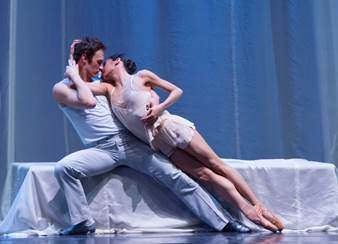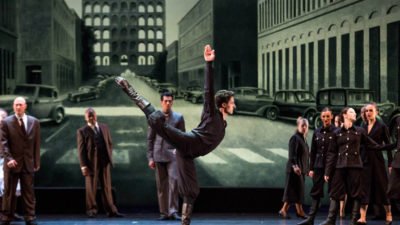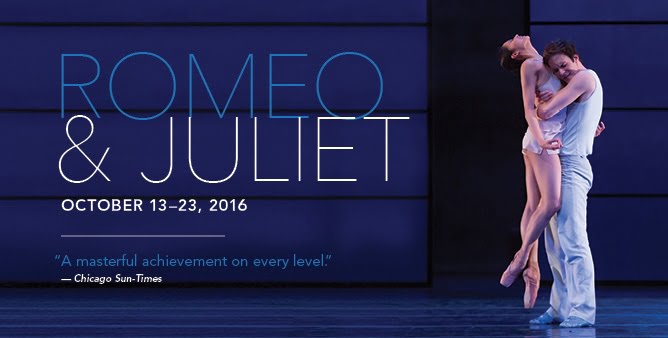Romeo & Juliet – The Joffrey Ballet
Music by Sergei Prokofiev.
Based on the play by William Shakespeare.
Choreography by Krzysztof Pastor.
Music Direction by Scott Speck.
Music Performed by the Chicago Philharmonic.
Produced by The Joffrey Ballet.
At The Auditorium Theatre, Chicago.
The Timeliness of a Timeless Story, a Few Times Over.
How does one show forth the timeless universality of a story written over 400 years ago? Apparently not by staging a faithful reproduction of it so that its timeless universality might stir us empathetically. No, such an idea is too démodé in our time, timely a historical folk as we are.

Fortunately for us two-timed by our timeliness to the universality of — love, friendship, factionalism, gang warfare, revenge, impetuosity — Shakespeare’s Romeo & Juliet, choreographer Krzysztof Pastor ensures that its timeless universality is manifestly manifest in his staged interpretation of Sergei Prokofiev’s musical interpretation of Shakespeare’s tragic romance known to the world as Romeo & Juliet — a gorgeous ballet production to be sure, but one whose story is muddled by Pastor’s contrived framing.
Pastor’s timely interpretation is timely indeed — if one sets one’s time by 20th century Italian history. Set over three periods of Italian political and social unrest, Pastor’s Prokofiev’s Shakespeare’s Romeo & Juliet becomes the 1930’s Capulet militaristic Fascists versus the Montague liberal low and middle classes; then, in the second act, the 1950’s Capulet Red Brigade political terrorists versus the Montague peace-loving liberal low and middle classes (?); and then, finally in the third act, the 1990s . . . we’re more or less back to plain-ol’ Romeo and Juliet — but in Berlusconi-led Italy of “increasing social divisions!” And for those of us who cannot imagine what these periods of Italian history must have looked like — any more than what Shakespeare’s time did look like — there are projections of Italian pedestrians milling about their ravaged country — which projections are not at all as helpful in focusing the story as they might sound.
Is it naïve to hope that — “neo-ballet,” universalizing contrivances notwithstanding — the essence of Romeo & Juliet might yet still move me? That its story at least might still persist intact?

The ballet did move me with pity, at the end, for Juliet, Christine Rocas, and her conflict with her overbearing father, Capulet, Fabrice Calmels — two impressive dance performances: the first for its sprightly, liquid gracefulness; the second for its enthralling animal magnetism and militaristic precision. And Yoshihisa Arai’s Mercutio virtually steals the stage in the first two acts as an endearing, fun-loving pest whose dynamic, fluid movements must only find comparison to a ribbon on the wind.
But Pastor’s universal vision overwhelms the first act and muddles the second, rendering the story of Romeo & Juliet rather difficult to comprehend, as familiar as it is. I can’t overstate the importance of reading the program notes: I didn’t read them for the first act and, even though I anticipated the modern setting, I still didn’t understand what was going on. Though the pivotal events occur as in the original play, many familiar characters are missing (e.g. the elder Montagues are noticeably missing, and the Prince and Juliet’s Nurse are missing, too), and the characters and their motivations are slightly altered. A big one, I thought, was Mercutio, who is portrayed as not being violent at all, and who dies not in fighting but by being stabbed in the back.
Moreover, Mercutio plays so prominent a role in the first two acts that I thought he was Romeo at first. Of course, the ballroom scene (whose “Dance of the Knights” was disappointingly underwhelming) set me straight: turns out Romeo is that insipid shadow who floats around the perimeter for the first two acts. Until at the very end when he is compelled — by passion? What passion? — by narrative to take his own life in grief, Rory Hohenstein’s Romeo is practically a passionless presence upon the stage, failing completely to convince me that anything like love exists — in Fascist Italy or anywhere. This was the gravest fault I found in this production, for, absent the palpable love that drives Romeo and Juliet to defy their allegiances, the story becomes a bland political drama — one which any setting might serve as a backdrop, be it Fascist/Communist Italy or a commune on Mars.
I find it no small irony that a ballet originally composed as a dramabalet (a dramatized ballet) should find a production that so confounds its drama that, in so doing, even undermines its choreographer’s pretensions at demonstrating its timeless universality — which pretensions he need not even had considered, it being nearly 100 years after the ballet’s composition and 400 years after the play’s publishing — demonstrating, de facto, that Romeo & Juliet, yes, still bears significance to our lives.
Excepting Pastor’s errant vision, the ballet is still a visual beauty, with moments that drew from me physical reactions of awe; and Prokofiev’s composition, performed here by the Chicago Philharmonic, is just as lovely on the ears as the dancers’ elegant movements are on the eyes. So, I imagine the novice ballet attendant (like me) will still find much to feast on visually and auditorily in this production, and the balletomane, too, (scoffing at my jejune assessment) might still appreciate the sophistication of Pastor’s lofty vision. But, again, be sure to read the program notes because this story is a universe and a time apart from Shakespeare’s original masterpiece — and far lesser in depth of feeling.
Recommended.
August Lysy.
Reviewed on 14 October 2016.
For more info checkout the Romeo & juliet page at theatreinchicago.com
Playing at the Auditorium Theatre, 50 East Congress Parkway, Chicago. Tickets are $34 – $174.

